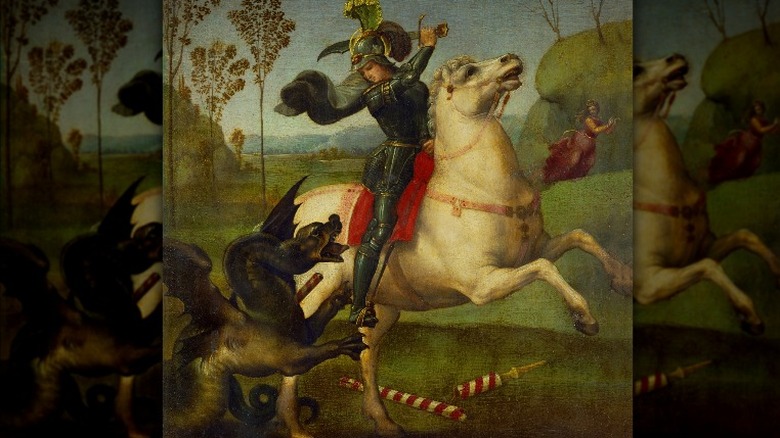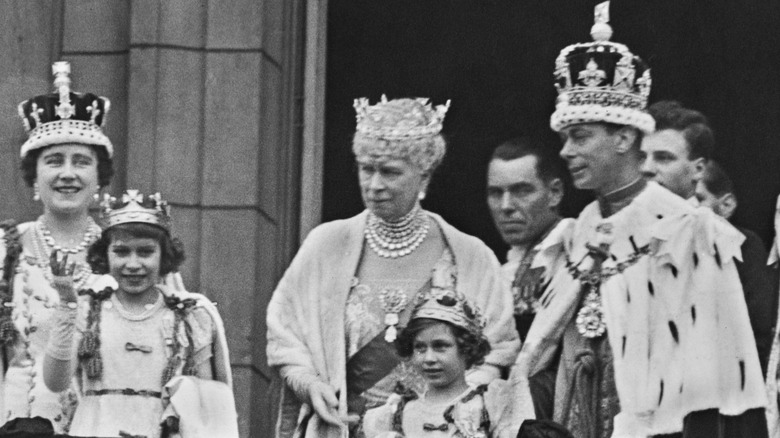The Meaning Behind Prince George's Name
Most 9-year-old boys like to imagine what they might be when they grow up, changing their minds a number of times along the way. Prince George already knows what his future holds: becoming the king of England. Although George is known for having a lively, mischievous personality, he also knows he has serious responsibilities ahead.
His parents kept that in mind while choosing his name. So how did William, Prince of Wales, and Catherine, Princess of Wales, settle on the name of their little heir to the throne? The Times (via the Mirror) reports that Kate supposedly was fond of the name Alexander, but there were other contenders for a boy's name as well — George among them.
The story goes that William and Kate wrote their top-choice picks on separate slips of paper and laid them on the floor and then watched as their dog Lupo came into the room. Whichever paper Lupo gravitated toward, they decided, would be their son's name. Lupo reportedly trotted to the "George" paper, and the decision was made.
Kate has since admitted that she was anxious about selecting all of their children's names since the world would be watching and judging (via People). They couldn't have made a better choice for their firstborn. The name George has great significance not only on a national level but on a personal one as well.
George is a major figure in British history
Ironically, this popular royal name comes from very humble origins. According to Nameberry, George comes from the Greek word for "farmer" — quite a far cry from the life of a pampered palace member. Yet Britons are more likely to associate the name with a national hero than a man with a plow.
St. George is the patron saint of England, per Britannica. Legend has it that George killed a dragon to rescue a princess, and, in exchange, the kingdom's subjects were baptized as Christians. Roughly 1,000 years later, King Edward III established the Most Noble Order of the Garter, an elite knighthood organization, and designated St. George as its patron.
But, as with most legends, the tale of St. George has played a bit fast and loose with the truth. English Heritage explains that George wasn't even British to begin with; he was born in what is now Turkey and became a soldier in the Roman army. In fact, he never set foot in England at all. And the dragon? Probably just an allegory.
But George's courageous deeds and willingness to die for his faith made him a popular figure in Europe, and he was designated England's patron saint. April 23, his feast day, is a minor holiday in the country. He also figures in a famous Shakespeare speech: In "Henry V," King Henry tells his troops, "Follow your spirit, and upon this charge / Cry 'God for Harry, England, and Saint George!'"
Prince George has a beloved namesake
Although Prince William, Prince of Wales, and Catherine, Princess of Wales, have never officially confirmed the story about Lupo picking their firstborn's name, it's likely they would have gone with George anyway. The name has special significance among the Windsors since it was the name of the last king of England.
Born Albert Frederick Arthur George Windsor, King George VI took his fourth name after his brother, Edward VIII, abdicated the throne. It's believed that he was honoring the wishes of Queen Victoria, who reportedly didn't want her beloved husband, Prince Albert, to be upstaged by a future king, per Express.
With Edward out of the picture, King George's family automatically assumed the line of succession. They might have done so even if Edward hadn't abdicated; per Royal Central, Edward had no children, so his brother would still have been his heir. George's oldest daughter succeeded him, reigning for 70 years until Queen Elizabeth's heartbreaking death this September at age 96.
Now, King George's oldest grandson, Charles, is king, and, one day, his great-great-grandson will become King George VII. Only future generations will ever know whether young Prince George will pass on his distinguished name to one of his own children.


